 HIPAA, the Health Insurance Portability and Accountability Act, was enacted in the United States in 1996 to establish regulations for the protection of individually identifiable health information. It is designed to safeguard patient privacy and ensure the confidentiality of medical records. However, despite these regulations, violations of HIPAA still occur, and some types of violations are more common than others. In this blog post, we will explore the most common type of violation of HIPAA.
HIPAA, the Health Insurance Portability and Accountability Act, was enacted in the United States in 1996 to establish regulations for the protection of individually identifiable health information. It is designed to safeguard patient privacy and ensure the confidentiality of medical records. However, despite these regulations, violations of HIPAA still occur, and some types of violations are more common than others. In this blog post, we will explore the most common type of violation of HIPAA.
1. Unauthorized access of patient records:
One of the most prevalent violations of HIPAA is the unauthorized access of patient records. This occurs when healthcare employees or other individuals who do not have the necessary authorization access medical records without a valid reason. Unauthorized access can be intentional or accidental, but either way, it is a violation of HIPAA regulations. This type of violation often results from inadequate training, lack of awareness regarding privacy policies, or insufficient security measures in place.
2. Insider breaches:
Insider breaches are another common violation of HIPAA. These breaches occur when someone within an organization, such as a healthcare employee or contractor, intentionally or unintentionally discloses patient information without proper authorization. Insider breaches can happen due to various reasons, including curiosity, personal gain, or even a lack of understanding about the importance of patient privacy. These violations often require internal investigations and are a significant concern for healthcare organizations.
3. Lost or stolen devices:
Another prevalent violation of HIPAA involves the loss or theft of devices that contain protected health information (PHI). Healthcare organizations often use laptops, smartphones, and tablets to access and store patient records. If these devices are lost or stolen, it can lead to a breach of patient privacy if proper security measures like encryption and password protection are not in place. Such incidents require prompt reporting to the appropriate authorities and affected patients.
4. Improper disposal of records:
The improper disposal of patient records is a surprisingly common violation of HIPAA. Many healthcare organizations still rely on physical records, such as paper files, which need to be disposed of properly to prevent unauthorized access. However, if these records are not shredded or otherwise destroyed in a secure manner, they can end up in the wrong hands. Healthcare organizations must implement policies and procedures for the safe disposal of patient records to avoid such violations.
5. Inadequate security measures:
Organizations that handle patient health information are required to have proper security measures in place to protect against unauthorized access or disclosure. However, many healthcare providers fail to implement adequate security measures, making them vulnerable to breaches. Examples of inadequate security measures include a lack of robust firewalls, weak passwords, outdated software, or insufficient encryption. These vulnerabilities make it easier for hackers to gain access to patient records and compromise patient privacy.
6. Business associate violations:
HIPAA also regulates the actions of business associates, such as contractors and subcontractors, who provide services to healthcare organizations. These business associates must follow HIPAA regulations to ensure the confidentiality, integrity, and availability of patient records. However, violations by business associates are not uncommon. This can include situations where a business associate fails to adequately protect the patient data they have access to or if they use the data for unauthorized purposes.
Summary
There are several common types of violations of HIPAA. Unauthorized access of patient records, insider breaches, lost or stolen devices, improper disposal of records, inadequate security measures, and business associate violations are among the most prevalent. To prevent such violations, healthcare organizations must invest in proper training, implement robust security measures, enforce strict privacy policies and procedures, and regularly update their systems to keep up with the evolving threats to patient privacy. By prioritizing patient privacy and confidentiality, healthcare organizations can greatly reduce the occurrence of HIPAA violations and better protect the sensitive information entrusted to them.
Need Reliable Document Destruction in Liberal, KS?
M.F. Docu-Shred offers recurring container and scheduled purge services for businesses located in Southwest Kansas and the Oklahoma Panhandle. We also offer one-time destruction services to small businesses and residential customers that need high-end data protection on an infrequent basis. Document shredding and digital storage device destruction are a must for anyone that must protect the identities, personal details, financial information, and other personal facts about clients by law. Recent legislation includes California v. Greenwood, Health Insurance Portability and Accountability Act (HIPPA), Gramm-Leach-Bliley Act (GLBA), Bill C-6, and the Fair and Accurate Transaction Act (FACTA). Give us a call today to learn more about what we can do for you!

